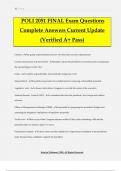Exam (elaborations)
POLI 2051 FINAL Exam Questions Complete Answers Current Update (Verified A+ Pass)
POLI 2051 FINAL Exam Questions
Complete Answers Current Update
(Verified A+ Pass)
Cabinet - the group of presidential advisors who head the executive departments.
Council of Economic Advisers (CEA) - members advise the president on economic policy and prepare
the Annual Report of the CEA.
Cri...
[Show more]
Preview 4 out of 48 pages
Uploaded on
December 30, 2024
Number of pages
48
Written in
2024/2025
Type
Exam (elaborations)
Contains
Questions & answers
Institution
POLI 2051
Course
POLI 2051
$13.49
Also available in package deal from $55.05
100% satisfaction guarantee
Immediately available after payment
Both online and in PDF
No strings attached
Also available in package deal (1)
$ 123.90
$ 55.05
10 items
1. Exam (elaborations) - Poli 2051 hogan final exam questions complete answers current update (verified a+ pas...
2. Exam (elaborations) - Poli 2051 chapter 14 exam questions correct answers new update (a+ pass)
3. Exam (elaborations) - Poli 2051 final exam questions complete answers current update (verified a+ pass)
4. Exam (elaborations) - Poli 2051 final exam questions verified marking scheme new update (a+ pass)
5. Exam (elaborations) - Poli 2051 final- lsu exam questions correct answers new update (a+ pass)
6. Exam (elaborations) - Poli 2051 exam 1 questions verified marking scheme new update (a+ pass)
7. Exam (elaborations) - Poli 2051 exam 3 questions complete solutions current update
8. Exam (elaborations) - Poli 2051 final exam questions complete answers current update (verified a+ pass)
9. Exam (elaborations) - Poli 2051 midterm exam questions correct answers new update (a+ pass)
10. Exam (elaborations) - Poli 2051 chapter 13 exam questions complete solutions current update
Show more
1|Page




